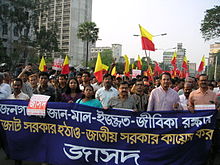Jatiya Samajtantrik Dal
Jatiya Samajtantrik Dal বাংলাদেশ জাতীয় সমাজতান্ত্রিক দল | |
|---|---|
 | |
| Leader | Hasanul Haque Inu |
| Founder | Serajul Alam Khan |
| Founded | 1972 |
| Headquarters | 22/1 Topkhana Road (4th Floor), Dhaka[1] |
| Ideology | Socialism |
| Political position | Left-wing |
| National affiliation | Grand Alliance |
| Colours | Red |
| Seats in the Jatiya Sangsad | 1 / 350 |
| Party flag | |
 | |
The Jatiya Samajtantrik Dal (Template:Lang-bn, 'National Socialist Party of Bangladesh', abbreviated JSD or 'জাসদ', JASAD) is a political party in Bangladesh.
History

The Jatiya Samajtantrik Dal (JASAD) was formed in 1972 when it split from Bangladesh Chhatra League, the student wing of the Bangladesh Awami League, under the leadership of Serajul Alam Khan, M. A. Jalil, ASM Abdur Rab and Shajahan Siraj. It had an armed wing, Gonobahini, led by Colonel Abu Taher and Hasanul Haq Inu, Kazi Aref Ahmed, Monirul Islam, Sharif Nurul Ambia that led a violent left-wing insurgency against the government of Sheikh Mujibur Rahman.[2] Their aim was to form a new left wing democratic national government, for facilitating establishing a socialist state along the Bangladesh characteristics. This led the government to form the Jatiya Rakkhi Bahini, the aim of which was to counter insurgency by the Jatiya Samajtantrik Dal (JASAD) activists.[3]
Assassination of Sheikh Mujibur Rahman
Before the coup of 15 August 1975, Jatiya Samajtantrik Dal had planned to organize a mass upsurge to form a democratic national government replacing Sheikh Mujibur Rahman.[4]
After father of the nation Sheikh Mujibur Rahman and his family were assassinated on 15 August 1975, Jatiya Samajtantrik Dal leader Abu Taher showed his support and remarked: "The corpse of Sheikh Mujib Should have been thrown into The Bay of Bengal".[4]
On 7 November 1975, forces loyal to Colonel Abu Taher rescued army chief Ziaur Rahman from house arrest. When Ziaur Rahman realized that Abu Taher was moving the country into a direction of leftist communism which contradicted Zia's right wing views, Zia declared martial law, formed the right wing Bangladesh Nationalist Party and cracked down on the Jatiyo Samajtantrik Dal by executing Abu Taher and sentencing other leaders to various prison terms.[4][5] Now the party president is Sharif Nurul Ambia, Executive President Moinuddin Khan Badol MP, General Secretary Nazmul Haq Prodhan MP.
Factions
During Ziaur Rahman's rule, Jatiya Samajtantrik Dal split up twice. The party fragmented again during the regime of Hussain Muhammad Ershad in the 1980s, with ASM Abdur Rab and Shajahan Siraj heading two separate factions. Abdur Rab's faction, Jatiya Samajtantrik Dal-JSD, became the opposition after taking part in the 1988 elections that were boycotted by all major political parties. After the "Bangladesh Nationalist Party (BNP)" came to power in 1991, Jatiya Samajtantrik Dal allied itself with former rivals Bangladesh Awami League to counter growing BNP and right wing influence in the country. He later served as a minister from 1996 to 2001 in the Awami League-led government.[5] After the BNP returned to power in 2001, Shajahan Siraj merged his party with it.[5]
Meanwhile, Inu, who became MP after winning elections as a grand alliance nominee with the victorious Awami League's boat as his symbol in 2008, was made Information Minister.[5] after another split The General Secretary of the Inu-led faction is Shirin Akhter.[6]
See also
References
- ^ "Registration of Political Parties". Bangladesh Election Commission (in Bengali).
- ^ Alim, Syed Fattahul (1 February 2012). "Has Left Politics any Future?". Forum. Vol. 6, no. 2. The Daily Star.
- ^ Ahamed, Emajuddin (2004). The military and democracy in Bangladesh (PDF). Sydney: Australian National University Press. pp. 108–110.
- ^ a b c Ahsan, Syed Badrul (7 July 2015). "Bourgeois dreams of socialist revolution". The Daily Observer.
- ^ a b c d Hossain, Kazi Mobarak (13 March 2016). "Hasanul Haq Inu's JaSoD splits as he names Shirin general secretary violating the party constitution". bdnews24.
- ^ "JSD still relevant". The Daily Star. 1 November 2017. Retrieved 18 November 2017.
External links
- "Jatiya Samajtantrik Dal official" (in Bengali). Archived from the original on 8 January 2015.
